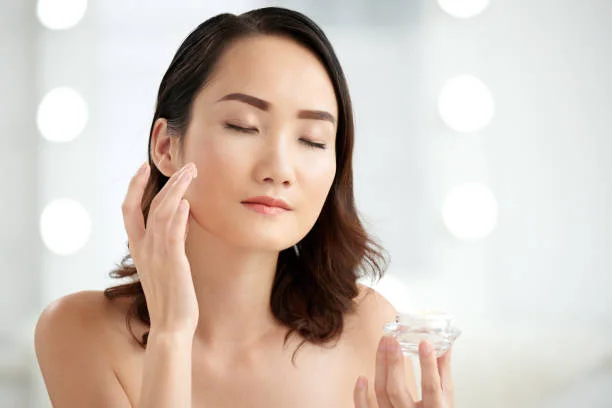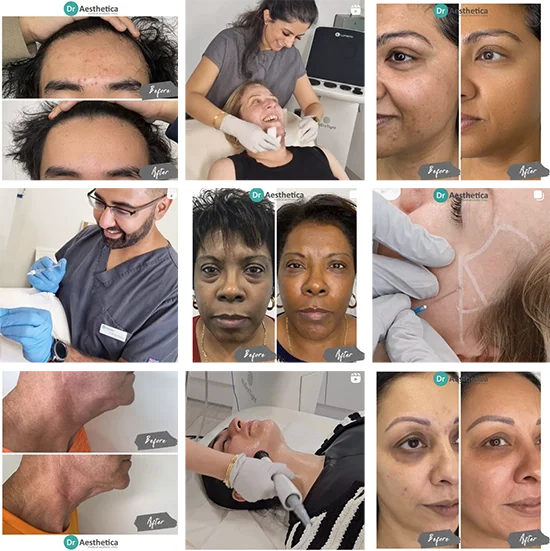Buying quality skincare products is a substantial investment. Like any investment, you want to get the most out of it. In the case of skincare, you need to understand the function of each product and the importance of layering.
What Is The Layering Of Skincare Products?
Layering is the process of applying the products in a predefined order in order to create the best chance for each product to perform its role seamlessly.
As a matter of fact, not following the correct order or combining ingredients that don't go well together can actually lower the efficacy of the products or even harm your skin.
At Dr Aesthetica, we are huge proponents of personalised skincare. We believe that everyone's skin is unique and therefore requires a customised routine that effectively addresses any issues.
Taking a cookie-cutter approach is a big reason behind why so many people end up disappointed with the results even after investing in the best products.
The Benefits Of Layering
Watch any of your favourite celebrities nighttime skincare routines, and you will realise that most have a very meticulous skincare routine behind their glowing skin. A great skincare routine only comes together when you appreciate that you have to use the correct products in the right way.
Layering will help you do just that!
- It ensures that you do not combine ingredients that repel each other. Applying products that do not work well together can cancel out their effectiveness and leave you with a routine with no added benefits to your skin.
- It reduces the risk of unwanted reactions and irritation that can lead to new skin problems.
- It makes you more mindful to ensure that you use the right products for your specific skin goals.
- It prevents you from piling up your face with unnecessary products which don't accelerate the improvement and often are a waste of time and money.
What Is The Correct Order To Layer Your Products?
Whether you follow a simple or a complex multistep skincare routine, layering is all about making the most of your products.
One factor that will always influence how you later products is the time of the day. General speaking, a morning skincare routine focuses on protecting your skin from damage by the elements ( exposure to UV rays, pollution, harsh weather etc.)
On the other hand, the primary goal of a nighttime routine is replenishing, repairing and regenerating the skin.
With that in mind, let's get down to the actual layering.
1. Cleanser

The first step is cleansing your face. This is always the first stage, whether it's a morning routine, night routine, makeup removal routine, post-workout routine, etc. You should never miss this step!.
The type of cleanser you use is dependent on the type of skin you have. We recommend AlumierMD Acne Clarifying Cleanser if you have acne-prone skin. The soothing SensiCalm Cleanser is always a good bet for those with sensitive skin, while people with dry skin can use HydraBoost Cream Cleanser.
Gently massage the cleanser over your face and neck. Rinse thoroughly with lukewarm water and pat dry.
Toner
After cleansing, using a toner will set the stage for the rest of your skincare routine. First, toners help clean dirt, oils and impurities more efficiently than using a cleanser alone. They also help reduce pores' size and prep the face for the products to be added.
Many toners contain alcohol, which can dry out your skin and cause irritation, so be sure to check the ingredients list. Preferably opt for alcohol-free rose water toners, which are naturally hydrating, and help increase absorption of your moisturiser.
2. Serums & Retinol
In our post: Skincare Terms You Need For Youthful Glowing Skin, we talked about active ingredients—the superpower behind serums.
Containing highly concentrated formulas of active ingredients, serums are made to target very specific skin concerns. While there's probably a serum out there for almost any skin problem, our favourite is Vitamin C serum.
At the start of this section, we mentioned that the time of the day impacts how you layer your skin products. Here's where this factor starts to come into play.
Vitamin C, known for its impressive antioxidant properties, will protect your skin from damage by environmental stressors like UV rays and pollution.
Retinol is highly praised for its ability to increase skin cell turnover, reverse skin damage and minimise signs of ageing. On the flipside, retinol makes your skin more sensitive to UV rays and should only be used at night.
For your morning routine, we recommend using Alumier MD EverActive C&E Serum and for your nighttime routine, Retinol Resurfacing Serum 0.25 if you are just getting started with retinol.
For the best of speciality serums for layering, click here.
3. Eye Cream

The skin under your eyes is thin, extremely delicate and often the first to show signs of ageing. As a result, you have to keep it moisturised all the time to prevent fine lines, dark circles or puffiness.
Using an eye cream such as AluminEye can significantly improve the appearance of dark circles, fine lines and puffiness.
If telltale signs of ageing have already started showing, Retinol Eye Gel will minimise the appearance of fine lines and wrinkles and firm up the skin around your eyes.
4. Moisturiser
The benefits of moisturiser have probably been documented more than any other product on this list. But we won't go into all that today.
Instead, we will focus on one question: Does oily skin need a moisturiser? And the answer is Yes, oily skin needs a great moisturiser just as much as any other skin type.
Skipping moisturiser altogether can actually cause oil glands to go into overdrive. As a result, your complexion can start to look even more oily!
If you have oily skin, it's best to opt for oil-free, water-based, non-comedogenic (read: doesn't clog pores) moisturiser like HydraClarité Moisturizer absorbs quickly with no residue.
Obviously, if you have dry skin, you must pay even closer attention to the moisturising step to avoid flaking and painfully tight, sandpapery skin. HydraDew Moisturizer is an intensely hydrating moisturiser that's perfect for dry skin.
Also, the moisturiser you use will be influenced by the season, i.e. your summer moisturiser will most likely not cut it for winter.
Read: Dry vs Dehydrated Skin: How to Combat 'Winter Skin'
Make sure you moisturise twice daily, once in the morning and before bed.
5. Sunscreen
Given that we are a medical aesthetics clinic that specialises in non-surgical anti-ageing treatments, we will never get tired of speaking about the importance of sunscreen.
Besides natural ageing, sun damage is the second leading contributor to skin ageing. From sagging skin to wrinkles to dull skin complexion, almost all telltale signs of premature skin ageing can be linked back to overexposure to sunlight.
To protect your skin from them, you must apply sunscreen every day, regardless of the time of the day, weather or location. This is often the final step but an extremely crucial layer of any skincare routine.
Read: What Happens To Your Skin in Your 20s, 30s, 40s, 50s, and Beyond.
The Dos And Don'ts Of Layering Your Skincare Products?

Before you start layering your skincare products, here are some guidelines that you should adhere to:
1. Products need to be applied based on their consistency, from lightest to thickest. Start with those with the lowest viscosity, such as cleansers and toners and serums. Then move up the scale to the thicker ones such as moisturisers and sunscreens.
2. Start with water-based products before using oil-based products. The purpose of oil-based products is to lock in moisture. If you apply a water-based product afterwards, the skin won't absorb it well.
3. Layering retinol and Vitamin C one after the other could cause skin irritation. Alternate it with retinol each evening if you want to use vitamin C in your nighttime skincare routine.
4. Though it might seem tempting, do not mix products to combine steps or skip them. Mixing products can compromise their efficiency.
6. Sunscreens should always go last (but before makeup).
Where To Go From Here
Starting a winning skincare routine can be very confusing. With the endless list of products available in the market today, creating a regimen that suits your skin type and concerns can feel like an insurmountable task.
But we are here for you. Talk to one of our skin specialists today, and we will help you come up with an ultra-customised routine that caters to every one of your skincare needs. Better still, due to our years of experience working with patients with a wide range of skin concerns, we are able to recommend the best product for each layering step.


